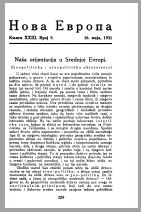
Benžamen Konstan
Decembra 1930 navršilo se je sto godina od smrti Benžamena Konstana, ≫oca parlamentarnog liberalizma i psihološkog romana ≪, kako ga nazva jedan njegov skorašnji biograf.
More...We kindly inform you that, as long as the subject affiliation of our 300.000+ articles is in progress, you might get unsufficient or no results on your third level or second level search. In this case, please broaden your search criteria.

Decembra 1930 navršilo se je sto godina od smrti Benžamena Konstana, ≫oca parlamentarnog liberalizma i psihološkog romana ≪, kako ga nazva jedan njegov skorašnji biograf.
More...
In this text the concept of the sublime is recognized as one of the most important in Kant’s philosophy. In the first part the essay deals with the influence of British aestheticians of the Enlightenment on Kant’s theory of the sublime: Addison’s outline of the notion of greatness, Burke’s concept of the sublime and Hutcheson’s definiton of beauty as a phenomenological quality of human mind’s experience. In the second part essay focuses on the relations between the aesthetic and the moral from the standpoint of transcendental analysis. Comparing and contrasting key characteristics of judgment of beatuy and judgement of sublime author examines the boundaries of this method. In author’s opinion, transcendental analysis, when the concept of the sublime is concerned, reaches its highest point, that is to say, it has been brought to the very edge of the abyss of subjectivity.
More...
The central question posed in this paper is whether (and how) it is possible to defend Kant’s concept of transcendental freedom. In order to provide an answer to this question, the argument of the third antinomy is examined, as well as the application of the solution of this antinomy to the sphere of human action. Comparative analysis of the most common interpretations of Kant’s position leads to the conclusion that the idea of transcendental freedom is plausible, but only if we accept the basic concepts on which Kant’s philosophy rests, in the first place the doctrine of transcendental idealism, and if we adequately interpret the arguments Kant gives us.
More...
The main question in this paper is if (and how) in Kant’s theory of sublime the object could be integrated into an emotional experience. In order to understand this problem, the ambivalent Kant’s claims will be addressed: (1) about the object as sublime and (2) that correctly understood it is not an object, but the state of the subject which is sublime. The latter thesis could be even strengthened with accompanying claim about formlessness of the object, which implies that this object can not be a part of conscious experience. Further, I will discuss Kant’s thesis about a subreption of a respect for the object instead of for the idea of humanity in our subject, as well as various interpretations of it. In the final part of the paper, I will introduce alternative interpretation which could give us a more plausible outline about the intentionality of the feeling of sublime. My claim is that Kant uses language available to him in order to state that in sublime there is no object of cognition in conscious experience. However, the object is constituted as an object of the violent emotional intentionality – sensibility brought under ideas of reason.
More...
In this article I explore how Hume’s views on the relationship between scepticism and philosophy developed and matured throughout his philosophical career. Hume’s first work, A Treatise of Human Nature, leaves open the question of why would anyone pursue philosophy in light of the discovery that sceptical arguments are irrefutable. What I aim to show is that, although Hume’s attitude to scepticism and his own sceptical position remain essentially unchanged over the years, An Enquiry Concerning Human Understanding and the Dialogues Concerning Natural Religion, along with a couple of his minor writings, contain interesting changes, additions and improvements to his thinking about the way scepticism can inform our philosophical enquiries. Only in his last work Hume unambiguously claims that scepticism does have a positive and lasting influence on our philosophising, and this influence consists in intelectual modesty and subject-matter limitations whithin philosophical investigations.
More...
It is often claimed that Hume’s doctrine of calm passions represents a text-book case of an ad hoc supposition introduced to save Hume’s theory of motivation from insurmountable objections. One famous example of this sort of criticism can be found in the writings of Barry Stroud, who claims that Hume’s doctrine of calm passions cannot avoid circularity and, more importantly, it directly contradicts one of Hume’s fundamental principles—i.e. the ‘incorrigibility thesis’—according to which we cannot be mistaken about the contents of our own minds at any given moment. Although it is hard to deny that Straud’s objections have certain philosophical appeal, I will argue that there is a way to save Hume’s doctrine of calm passions. Following arguments presented by Daniel Shaw, I will defend the claim that calm passion should be understood as unactualized dispositions.
More...
It could be said that, in general, Postmodernism represented a special inspiration for reaffirmation of the Enlightenment, and that the Enlightenment revised in response to this challenge. Defenders of the Enlightenment in the procedure used different strategies but, except for the occasional lump rejection and distorts, they all shared conviction that the theory of Postmodernism misrepresented itself. In their reconstruction of the position of Postmodernism, one shows that it comes to inherit the oldest traditions of the Counterenlightenment and the irresponsible relativist thinking. Another time it is emphasized the unfounded sheltering of the theory of Postmodernism behind the counterfeit principle of the Enlightenment or, even less based, boastfully as well as illusory breaking with Modernity. The third approach entered Postmodernism in the tradition of „with itself quarreling Modernism” by the very effort to go beyond it; in the tradition of the Enlightenment and its relentless criticism as an integral part of the same endeavor. It is concluded that none of the apology of the Enlightenment, to its own detriment, succeded to consistently incorporate cutting edge of postmodern objections and, under duress to defend and profiled its own orthodox point of view, by its psychosocial neutralization violates the critical potential of the Enlightenment.
More...
The Article explains Gadamer’s critique of Kant’s aesthetics in Truth and Method (1960). The paper first examines basics characteristics of Kant’s foundation of modern aesthetics (I). This is followed by consideration Gadamer’s interpretations of the process of the subjectivization of aesthetics in Kant’s Third Critique (II). Finally, it considers critique of abstraction aesthetic consciousness and conception of aesthetic differentiation as Gadamer’s attempt to through analysis of Kant’s theory of taste complete its own hermeneutics of art (III).
More...
Based on certain places in Descartes’ writings, regarding the notion of “free will”, it seems that Descartes may be interpreted as both a compatibilist and libertarian. Firstly, we claim that it is impossible to describe Descartes as a compatibilist, and the consequence of that proposition is that that it is impossible for him to be both a compatibilist and libertarian. By referring to Meditations, Passions of the Soul, Principles and Letters, we will show that Descartes is not a compatibilist, rather that he is a libertarian, since he places free will in an incompatible relation with determinism by allowing free will not to be restrained by anything, which leaves the “alternative possibilities” open. Afterwards we will respond to possible objections, out of which the main one will be related to determinism.
More...
Through a critical approach towards Fichte’s learning, Schelling opposed determination of nature as a limitation that “I” sets to itself so that it could know thyself. In his works on philosophy of nature, he determined nature as a developing dynamic system. In this work we strive to demonstrate that potenties of nature are one of the key notions of his speculative physics. Even though Schelling himself in that context does not mention Aristotle, our hypothesis is that Schelling’s speculative physics was greatly influenced by Aristotle’s insights from his so-called theoretical second philosophy.
More...
This article deals with actuality of Hume’s positive thesis about causality, specifically in modern science. According to Dauer, Hume in his Treatise of Human Nature does not deal with scientific theory which allows us, in modern times, to come to the truth, and then necessity. Also, he claims that observation alone, without theory is useless, which is the reason why we need science to predict future events. I intend to show that all three claims are incorrect, and to show an intimate connection of causality and our intuitions.
More...
The topic of this article covers the problem of the concept of a miracle from the standpoint of contemporary perspective concerning the Laws of Nature and from Hume’s standpoint of whether we are inclined to accept a miracle. This article is divided into two chapters both of which tend to show that we are not in a position to claim that miracles exist. The first reason is psychological in its nature. As Hume’s thesis about our experiencebased relation towards the world shows, we are not able to believe in a story about a miracle since it violates the regularity which is supposed to govern the Nature. Moreover, repeated experience is necessary for us in order to establish causality, but in the case of miracles, we lack such experience. The second reason concerning this presumption is that it does not mean that an event will not be scientifically explained in the future if it cannot be explained yet. Therefore, if the facts that scientific theories are not absolutes and that there are no explanations for such natural phenomena are taken into consideration, the question arises as to whether the concept of a miracle can be discussed.
More...
The author analyzes the key terms of Kant's definition of enlightenment: immaturity, guilt, humanity, laziness, cowardice, bravery, and others. The first part of the paper presents the criticisms that challenge every reasonable character of Kant's conception of enlightenment. After that, these critiques are confronted with the defenses of Kant's definition of enlightenment that points out, on the one hand, its self-reflectivity and, on the other, its everlasting actuality. Special attention is paid to the historical and textual reconstruction of the understanding of public as a condition of the possibilities for the effective engagement of the mind and the rational organization of society. It is concluded that the question of enlightenment remains open, to the extent that the danger of arbitrary use under a completely vague semantic rules threatening the very notion of enlightenment. Continuous reinterpretations of Kant's attempt to define it, however, are also testimonies of an unavoidable instance, with respect to which – by recognition of its relevance, its rearranging or rejection – different conceptions of enlightenment and its landmarks were tempted, articulated and established.
More...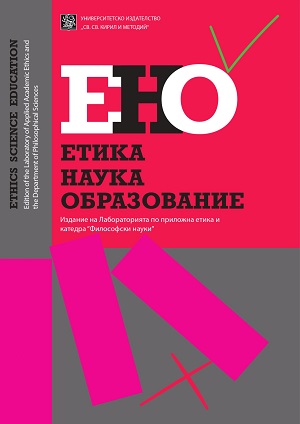
The article analyzes Kantian ethics in the context of the Enlightenment from three points of view: with regard to its semantic foundations, its principles, and in the light of its social applicability. The text explores the ontological considerations of faith and morality in the critical philosophy of Immanuel Kant. It leads to the conclusion that, in his philosophical system, creativity is the main criterion for both faith and truth. Achieving them lies in using criticism as a main method and morality as a guiding principle. The paper concludes that eudemonism is inherent in Kant’s ideas and examines the meaning of liberty in the Kantian doctrine of morality. The Kantian understanding of the enlightening role of philosophy for change and improvement is systematically derived. The analysis is based on the texts of Immanuel Kant.
More...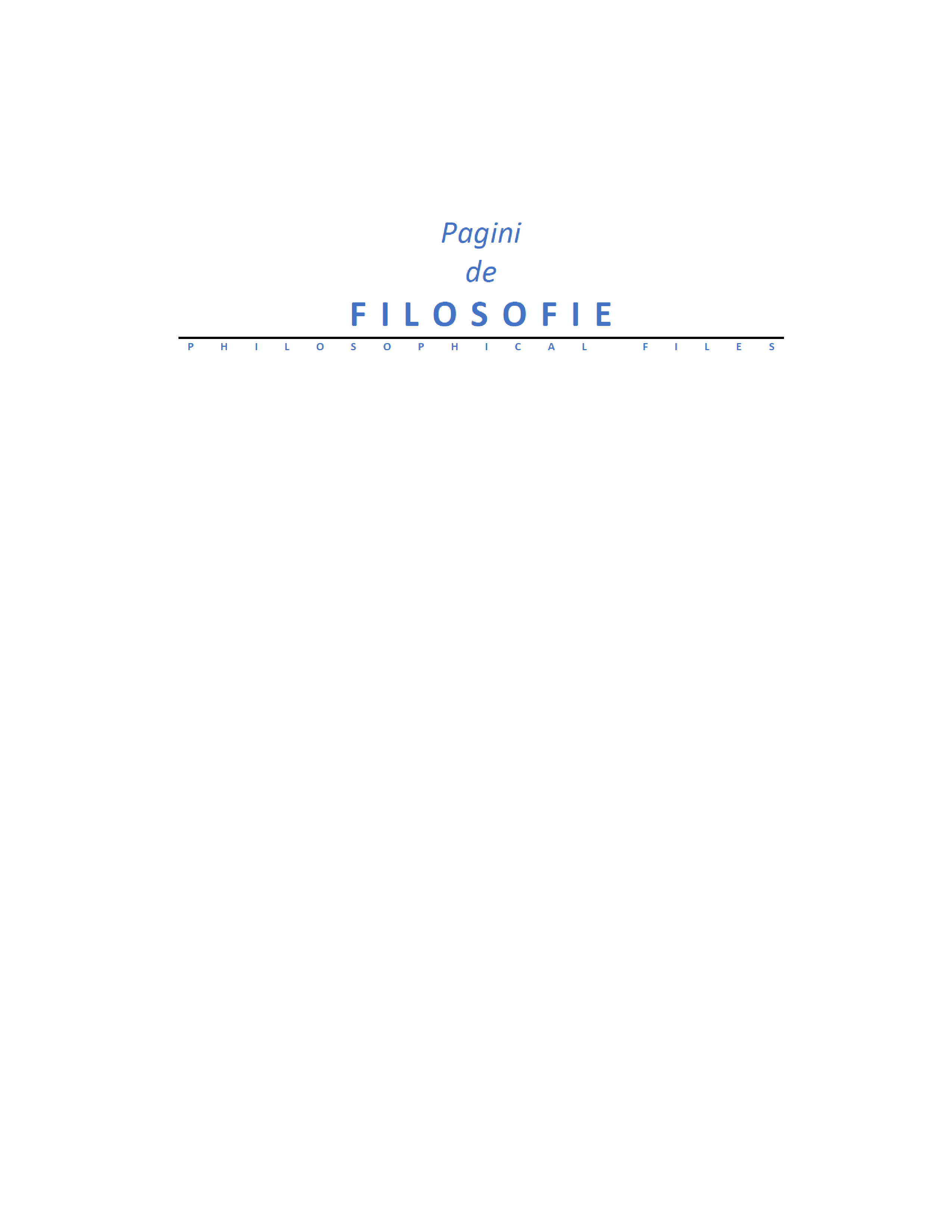
Lansarea volumului: Dragoș Popescu, Noi explorări în filosofia românească, Editura Tritonic, București, 2023
More...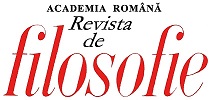
Quine’s idea of a naturalized epistemology built on the discoveries of psychology runs into a fundamental difficulty: we cannot establish the psychological truths unless we already have some previous epistemological principles, which leads us into a circular argument. In this article I will try to show that this situation is similar with that of David Hume, who discovered that it is not possible to justify the principle of the uniformity of nature either on reason or on experience. I will argue that the solution Hume finds to overcome this difficulty is the same with the one that can be found in the ideas of contemporary evolutionary epistemology and could provide a solution to the main problem anyone who wants to construct a naturalized epistemology has to deal with. Both the belief in the principle of the uniformity of nature and the fundamental structures of human cognitive psychology must be taken as valid and functional because they are hardwired in our brains as products of the long evolutionary history of our species, and have thus been tested and validated in a Popperian manner, by the mechanisms of natural selection in a way that no other scientific idea has never yet been tested and corroborated.
More...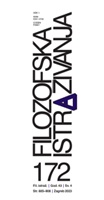
Review of: Immanuel Kant Kritika čistoga uma Naklada Jesenski i Turk, Zagreb 2021., prev. Viktor Sonnenfeld Kritika praktičkoga uma Naklada Jesenski i Turk, Zagreb 2022., prev. Viktor Sonnenfeld Kritika moći suđenja Naklada Jesenski i Turk, Zagreb 2022., prev. Viktor Sonnenfeld
More...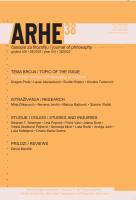
In this paper I will inspect the relation between the epistemologically privileged idea and the foundations of metaphysics in Descartes’s and Spinoza’s philosophy. I would like to show how the focus on the Cogito ergo sum in Descartes, that is, on the idea of the most perfect being in Spinoza, influenced the framework of their metaphysical projects. I will firstly analyze Descartes’s and Spinoza’s reasons for choosing exactly these ideas, and then I will try to reconstruct several objections and replies, that these two philosophers could have developed in reaction to each others position. The results will show that both thinkers are trying to enforce the meaning of the traditional definition of truth as adequatio rei et intellectus, with Descartes being more focused on the formal aspect of Cogito ergo sum as an idea, while Spinoza is more interested in the objective status of the content and meaning of the idea of the most perfect being.
More...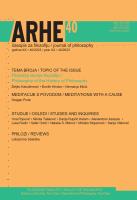
Τhe article will examine the remedies proposed by René Descartes (1596-1650), in order to deal with unpleasant passions and their excesses, as highlighted in his last work, The Passions of the Soul (1649). In this work, Descartes attempts to reach the core of emotion and, with the help of physiology, to analyse it rationally. The aim of the French philosopher is deeply moral. The demand for a practical philosophy had occupied him since the Sixth Part of his emblematic Discourse on the Method (1637). In The Passions of the Soul this demand is satisfied. Our analysis shows that Descartes' ethics is one of action. Life requires decisions, regardless of their end result. With free will as the cornerstone of his ethical structure, Descartes will set up an educational system for regulating the passions. In dealing with this problem, Descartes opted for a «strategy of generosity». Generosity, the most important notion of Cartesian ethics and the primary remedy that Descartes suggests for useless desires, is a passion and turns into a virtue when passion becomes a habit.
More...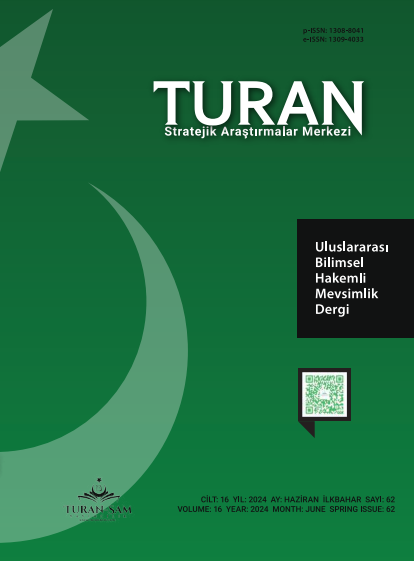
Rene Descartes, who holds a significants place in the history of philosophy, is one of the foremost figures of the Englightenment era. Living in a period merked by Church pressures, he emerged as a thinker who presented his meditations with alternative perspecvtives, effectively consturucting his own philiosophy. In constructing his philiosophy, he focused on the issue of God, an area that many philosophers of the time were either actively seeking answers to or at least engaging with. In this study,the influence of the question of God on Descartes philosophy, which he articulated with the aim of questioning the limits of knowledge and re-estableshing the foundations of science, has been examined.
More...